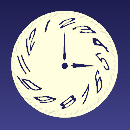

This patient story was originally posted on the Society for Research on Biological Rhythms (SRBR) blog, and is reproduced here with permission.
As daylight fades, my brain and body start to wake up, and by the time it's dark out, I'm feeling my best — physically and mentally. From reading to exercising to socializing, I do everything smarter, faster and better in the afternoon or later.
Regardless of how tired I am during the day, or how little sleep I got the night before, I can't naturally fall asleep until the sun is close to rising. On a perfect day, I wake around noon, eat lunch at 2 pm, work out at 6 pm, eat dinner at 9 pm and socialize after 11 pm when I'm happiest and most relaxed.
Unfortunately, this is a 4-hour lag from what society considers "normal." Despite massive shifts in the way we work, the 8-to-5 work schedule continues to be the norm. I've spent most of my life trying to fit my atypical sleep-wake cycles into a schedule that was devised, hundreds of years ago, to maximize hours for farming. Today, only 1.3% of the U.S. population is involved in agriculture.
By the time I was in 3rd grade, it was clear I wasn't going to be a "morning person." My sleep onset time was late and I lay awake for hours after "bedtime" — making it to school on time because it didn't start until 9 am.
Things got worse when I reached puberty. I couldn't fall asleep before 3 am and I had to catch the bus at 7 am as middle school started at 7:30 am. Just as my internal body clock was shifting even later during adolescence (which is typical of all mammals), school started an hour and a half earlier.
Sleep deprivation is a form of torture, which is only made worse by constant criticism from parents, teachers and friends who echoed the same piece of advice: "Why don't you just go to bed earlier?"
Not only did I feel sleep deprived, but I also felt like a loser. After all, sleep is a subconscious behavior — how could I fail at that? To this day, physicians still tell us that adjusting our sleep patterns is just a matter of willpower and self-discipline.
During my sophomore year of college, I switched all of my classes to the afternoon and evening and effortlessly transitioned into a semi-nocturnal being. Life was good. I still believed that once I got a job in "the real world," I would get into a routine and conform to regular hours.
When I did get a "real job" after college, my mind and body didn't adapt to the new hours. To "fix it," I kept a stricter and stricter schedule, waking at the same time every day — even on the weekends; restricted alcohol, caffeine and eating in the evening; exercised at certain times; and attempted chronotherapy (its efficacy on DSPDers like me is still unclear). But NOTHING worked.
By the time I was 25, I had sought help from a range of physicians (neurologist, pulmonologist, psychiatrist) — all of whom misdiagnosed my delayed sleep as "insomnia."
FINALLY, when I was close to 30, I was diagnosed with Delayed Sleep Phase Disorder, a circadian rhythm disorder. I was working as a freelance contractor — trading lower pay, no health insurance and no career advancement for a more flexible schedule. But it was worth it to have a later start time and not live against my body clock.
A few years later, in a support group for night owls - which blissfully met at midnight in Berkeley — I learned of a study at UCSF that was researching circadian clock gene mutations for sleep disorders. I immediately joined and provided a blood sample, as did my dad. Two years later, I received an email from the study coordinator — they had discovered relevant findings in my family's DNA!
Vindication at last!!!
More to come...
* Alexandra Wharton is a board member and the social media liaison for Circadian Sleep Disorders Network and the chapter leader for Start School Later — Texas. She writes and tweets (@DelayedSleeper) about living with Delayed Sleep Phase Disorder at Delayed Sleeper.